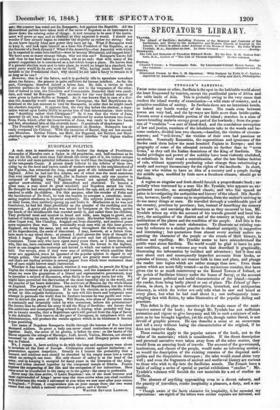EUROPEAN POLITICS.
A rash man is sometimes requisite to further the designs of Providence. Alexander of Macedon cuts a figure in old prophecies, and, half-madman as he was all his life, and more than half-drunk the latter part of it, his violent actions bad a wider and more potential influence on the world than the thoughtful energies of the temperate Cmsar. A person much inferior to the inferior of these two, rising up on the level and barren sands of modern society in the neighbourhood of the Pigmies, has attracted the long, stupid gaze of the infatuated and the af- frighted. After he had lost five armies, one of which was the most numerous that ever marched upon the earth, for in Eastern armies, only one quarter is composed of fighting men,) Napoleon warred not against windmills, but against snow-storms, and fled discomfited and shattered. To become a great man, a man must do great mischief; and Napoleon earned his title. He thought he had strength enough to throw back the age, and, at all events, was resolved to stifle its children. For this purpose, after the murder of Palm and the banishment of De Steel, he took the trouble to compose a catechism, incul- cating implicit obedience to Imperial authority. His subjects kissed his sceptre on their knees, then suddenly sprang up and broke it. Mendacious as he was and fraudulent, he had fed them plentifully on the plunder of the confiding and the conquered. A gouty old glutton was seated by foreigners on the throne, patted the beads of the bloodhounds that crawled under it, and called them his children. They preferred meat and marrow to bread and milk, soon began to growl, and, instead of licking his sores, bit shrewdly into them. His brother followed; and an- other Capet was, like Claudius, dragged out from obscurity, and rendered peace more expensive than war. The wretchedly weak men who at this hour govern England, are doing the same, and are sowing throughout the whole empire, in all its dependencies, the seeds of discontent. I may, however, at a future time, have more to say about them: at present I shall pursue the train of thought in which I began. England has forfeited all power and lost all influence on the Continent. Those only who have spent many years there, as I have done, and who, like me, have conversed with all classes, from the lowest to the highest, know or can imagine the contempt and hatred in which our nation is universally held. Our envoys, even if they were men of abilities, for which qualities they never are appointed, must be ignorant of the popular opinion in regard to our foreign policy. Our journalists of every party are greatly more clear-sighted; and there are leading articles in several papers from which wiser statesmen than any of ours might borrow lunch instruction. Whether it was honest, or, indeed, whether it was politic, to permit the King of Naples the violation of his promises and treaties, and the massacre of a nation to whom we were the guarantees of a liberal and representative government, may be hereafter a subject of discussion, when Sicily in her agony turns her side. We might have prevented the destruction of the most beautiful city in the world, and the murder of her brave defenders. The survivors of Messina lay the whole blame on England. The people of France, not only the Red Republicans, but the whole people, are incensed at Cavaignac. If he lose his election, as is probable, it will be lost by this culpable forbearance. In vain will this brave and temperate man attempt to persuade the world that he forebore because he was pacific and reluc- tant to disturb the peace of Europe. Will Russia, who alone of European states is constantly and invariably ruled by wise statesmen, believe his protestation? She knows that be offered his army to aid the King of Sardinia: she knows that this ambitious and incompetent King refused it, fearing, what probably will hap- pen in twenty months, that a Republican spirit will prevail from the Alps of Savoy to the Adriatic. This reserve on the part of Cavaignac, in compliance with our Administration, will produce the results against which in its blindness it fancied it was providing.
The name of Napoleon Bonaparte thrills through the bosoms of Eve hundred thousand soldiers. So great a body can never stand motionless or at ease long together. Italy, the scene of its glories, is before its eyes: on the banks of the Rhone expands the mirage of Marengo; Lodi, Arcoli, Verona, Mantua, are already traversed by the ardent mind's impatient valour; and Hungary points out the way to Poland.
We, I repeat it, have nothing to do with the long and sanguinary wars about to inundate all the East of Europe. Civilization stands against barbarism; re- presentation against despotism. Greatly do I lament the probability that a humane and studious man should be absorbed by his empty name into a vortex which no strength can stem. His only chance of safety is at the head of the army, and in keeping it occupied for many years in the liberation of the king- doms and tribes chained together by the compound metals of Siberia. France requires the outpouring of her idle and the occupation of her industrious. Here clubs must be transferred to the camp or to the galley: the camp is preferable. Never may the time arrive, 0 Louis Napoleon! son of the most humane and most rightminded of kings never may the time arrive when you shall recollect with bitterness the words I addressed to you when we met soon after your return to England: " Prince, I congratulate you on your escape from the two worst curses that can befall a rational creature—a prison, and a throne."
WALTER SAVAGE LANDOIL


























 Previous page
Previous page